AI
our blog
10 Essential Elements for a Winning CX Strategy

Overview
The article identifies the essential elements for a winning customer experience (CX) strategy, underscoring the significance of components such as:
- Customer insights
- Personalization
- Omnichannel consistency
- Employee empowerment
Each element is substantiated by evidence and examples that showcase their contributions to enhancing client satisfaction, loyalty, and overall business growth. Furthermore, it highlights the interconnectedness of these factors in developing an effective CX strategy, reinforcing the necessity for a comprehensive approach that integrates these critical components.
Introduction
Crafting a winning customer experience (CX) strategy is no longer merely an option; it has become an essential component of business success. As companies strive to meet ever-evolving consumer expectations, understanding the key elements that drive exceptional CX can unlock significant opportunities for growth and loyalty.
However, with a multitude of strategies available, how can businesses effectively navigate the complexities of customer engagement to ensure they not only satisfy but delight their clients? This article delves into ten essential elements that form the backbone of an effective CX strategy, providing insights into how organizations can enhance their offerings and ultimately foster deeper connections with their customers.
Studio Graphene: Agile Methodology for Effective CX Strategy
At Studio Graphene, we implement an agile methodology that provides flexibility and facilitates rapid adjustments throughout the product development lifecycle. This approach ensures that client feedback is integrated at every stage, significantly enhancing our cx strategy. By emphasizing collaboration and iterative design, our team can quickly pivot based on user insights, ultimately enhancing our cx strategy and the overall client experience.
Our comprehensive digital product development services—Discovery, Design, and Build—are meticulously crafted to navigate you through your entire digital journey. This holistic approach not only fosters continuous improvement but also leverages automated alerts within our DevOps framework. These alerts enable timely interventions, minimizing the potential for issues and enhancing collaboration among stakeholders. By encouraging experimentation and innovation, we ensure that the final product not only meets but exceeds user expectations.
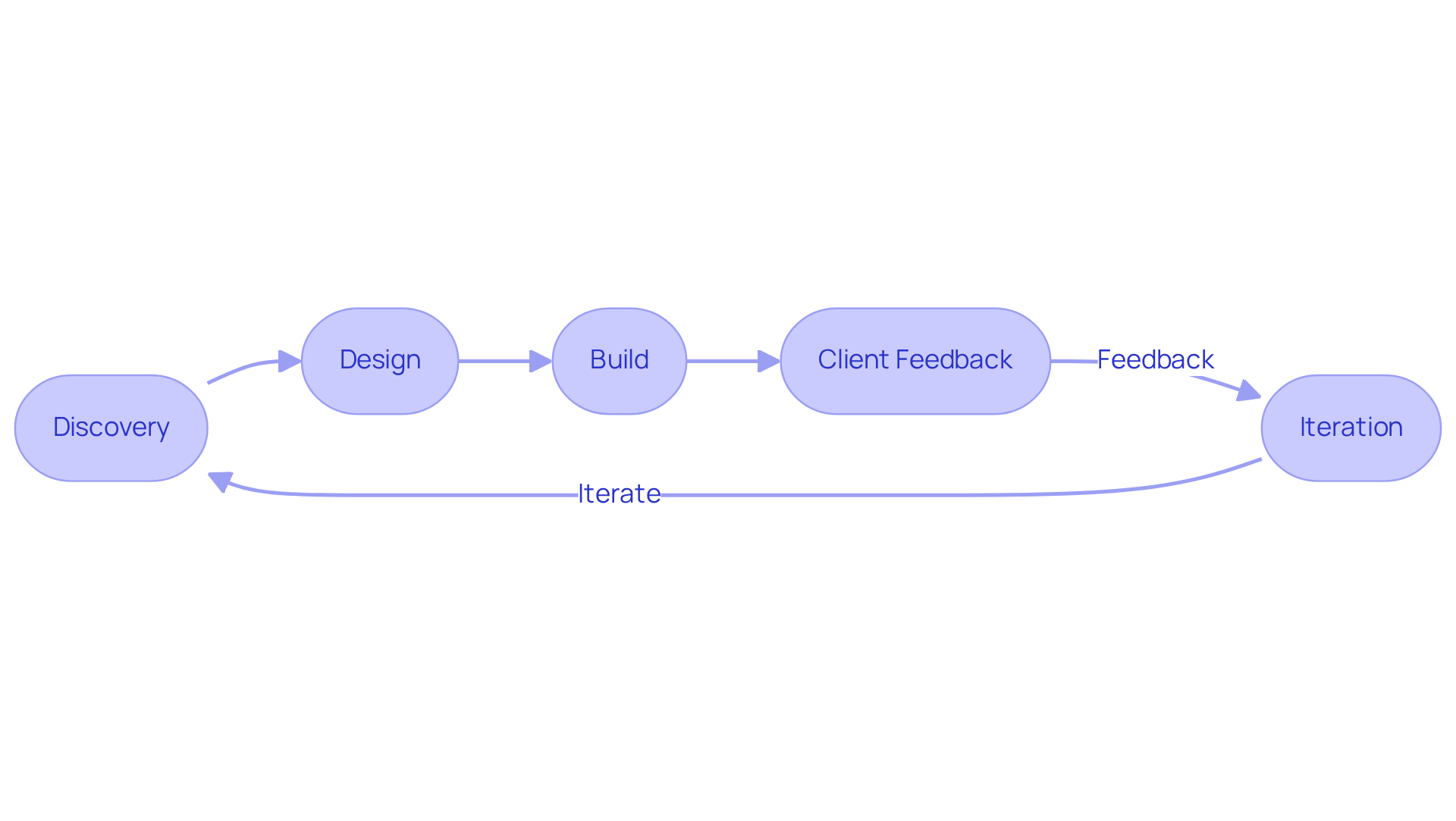
Customer Insights: Understanding Needs and Expectations
To create an effective cx strategy, it is essential to collect thorough client insights. Utilizing both qualitative and quantitative research methods allows for a deeper comprehension of client needs, preferences, and pain points. Techniques such as surveys, interviews, and remote usability testing yield valuable data that directly informs product design and development.
Recent trends indicate that leveraging AI and data analytics significantly enhances the identification of patterns in consumer behavior. For instance, AI tools can summarize client interviews and automate report generation, streamlining the insights-gathering process. This method enables a more tailored product development cx strategy, ultimately enhancing user engagement and nurturing client loyalty.
Statistics reveal that businesses efficiently collecting and applying client feedback can experience a significant rise in contentment, with satisfied clients being six times more inclined to make repeat purchases. Furthermore, satisfied clients share their favorable experiences with six or more individuals, amplifying the impact of satisfaction on company growth. By prioritizing client insights and incorporating regular check-ins with support teams, enterprises can create products that resonate with their target audience, driving both growth and operational efficiency.
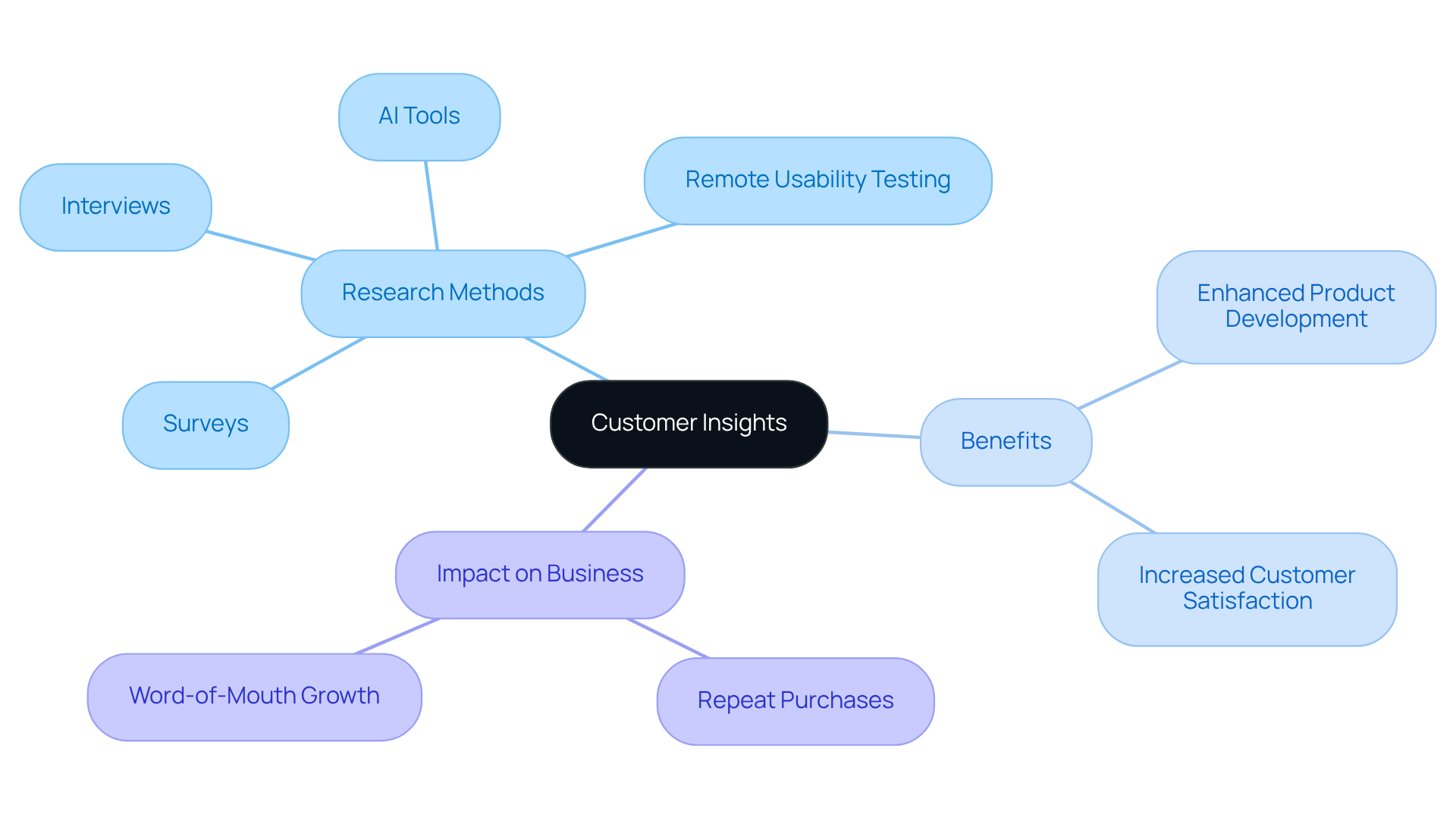
Customer Journey Mapping: Identifying Key Touchpoints
Client journey mapping serves as a vital strategic tool for businesses in their CX strategy, enabling them to visualize the various stages clients navigate when engaging with a product or service. By pinpointing key touchpoints—such as awareness, consideration, purchase, and post-purchase—companies can effectively identify areas for enhancement. Research reveals that 73% of individuals anticipate seamless journeys across all channels and devices, highlighting the critical need to optimize these interactions.
Studio Graphene employs journey mapping to ensure that each interaction is tailored for a seamless experience. This thorough process not only identifies potential pain points but also uncovers opportunities for enhancing client satisfaction and engagement. For instance, the development of a user-friendly mobile app and mobile-responsive web platform for Alchemy Wings illustrates how effective digital solutions can streamline the ordering process while providing valuable access to sales data. This approach not only simplifies navigation but also enhances user interaction through a structured interface.
Thought leaders emphasize the importance of recognizing key touchpoints in client journeys. As noted, "Good intentions alone are inadequate; operational gaps create friction that clients observe." This insight underscores the necessity for companies to proactively address client satisfaction challenges as part of their CX strategy. By concentrating on these critical touchpoints, businesses can cultivate loyalty and drive revenue growth, as evidenced by the fact that CX leaders experience revenue growth 80% faster than their competitors.
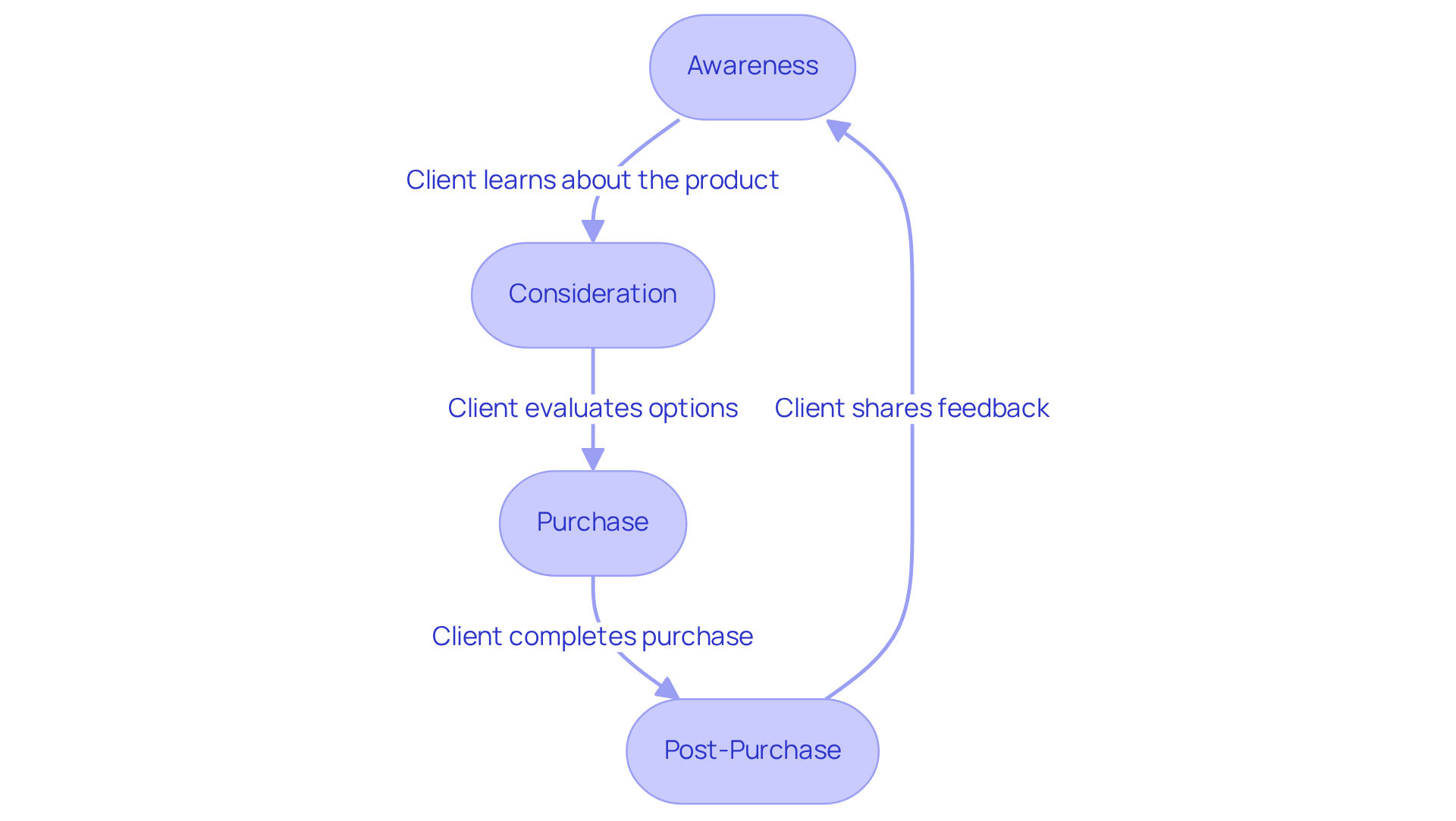
Personalization: Tailoring Experiences to Individual Customers
In today's competitive landscape, a cx strategy that focuses on personalization has emerged as a fundamental necessity for businesses. Harnessing the power of data analytics and AI enables companies to implement a cx strategy that crafts tailored experiences resonating deeply with individual clients. This cx strategy includes personalized recommendations, targeted marketing campaigns, and customized user interfaces that adapt to user preferences.
Studio Graphene distinguishes itself in this arena by developing innovative solutions that prioritize user-centric design. Their cx strategy ensures that each customer feels valued and understood, which is crucial for fostering long-term loyalty. Research indicates that companies excelling at personalization as part of their cx strategy are 48% more likely to exceed their revenue targets, while 89% of U.S. firms report increased revenue from implementing website personalization. These statistics emphasize the concrete advantages of the cx strategy.
Successful case studies further illustrate the effectiveness of personalized marketing campaigns in the context of a cx strategy. For instance, companies that adopt robust cx strategies report revenue boosts ranging from 10 to 15 percent, with some experiencing increases as high as 25 percent. This not only enhances user involvement but also cultivates a devoted client base, emphasizing the need for a cx strategy, as 76% of consumers express frustration when they do not receive personalized interactions. Furthermore, 72% of consumers expect companies to adopt a cx strategy that recognizes them as individuals and understands their interests. By incorporating AI-driven insights, Studio Graphene empowers brands to develop a robust cx strategy that forges significant connections with their clients, ultimately fostering sustained growth. As Esat Artug observes, 'Personalization isn't merely a trend; it's a crucial change in how successful businesses enhance their cx strategy to engage with their clients.
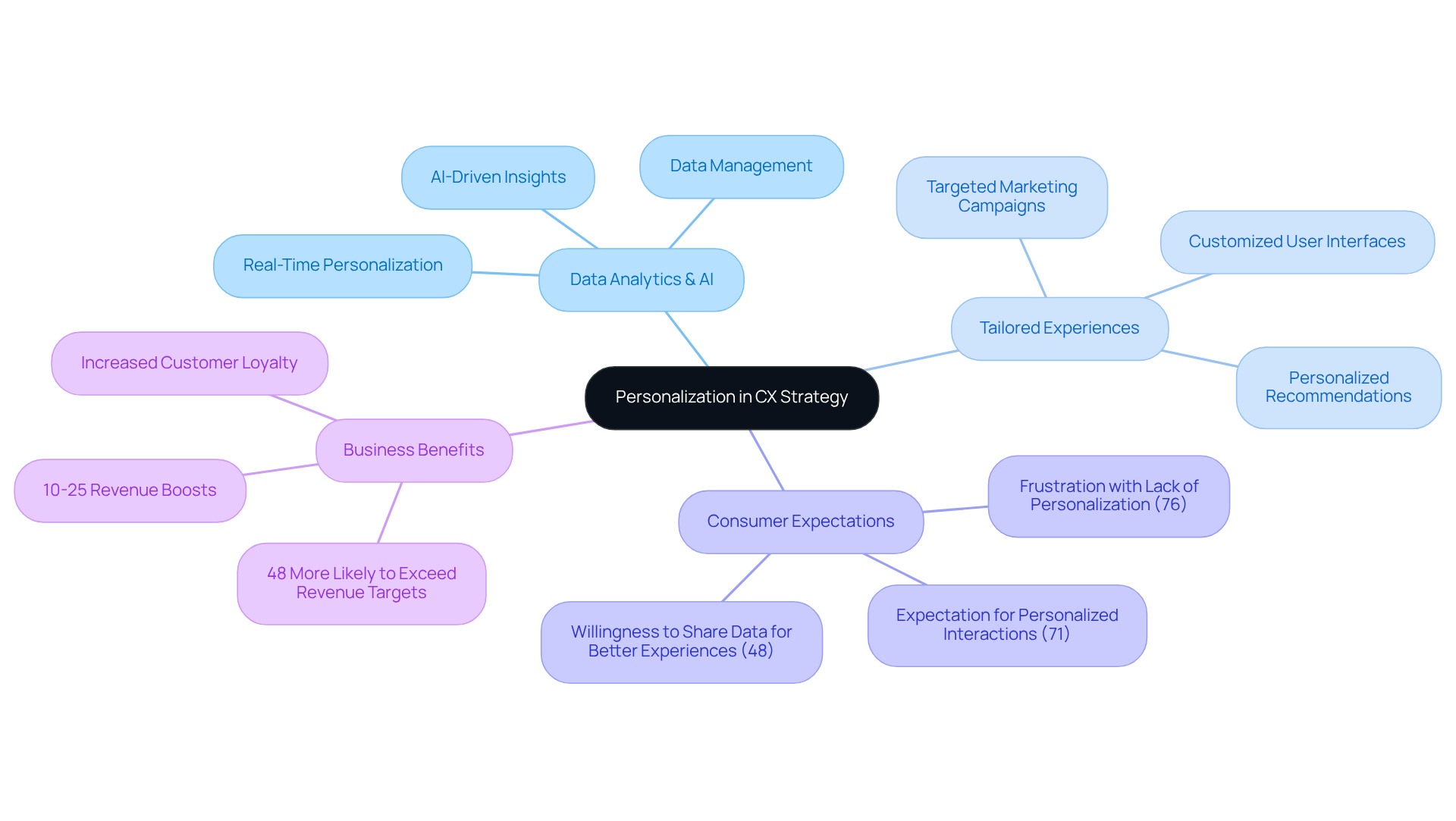
Omnichannel Consistency: Ensuring Seamless Customer Interactions
An effective cx strategy is essential for ensuring consistency across all client touchpoints, whether online or offline. This omnichannel approach allows individuals to engage with a brand effortlessly, regardless of the platform they choose.
Studio Graphene is dedicated to developing integrated solutions that facilitate cohesive interactions across various channels. A prime example of this commitment is our development of a user-friendly mobile app and responsive web platform for Alchemy Wings, which features intuitive navigation and easy access to comprehensive sales data. By maintaining brand consistency and ensuring that messaging aligns across platforms, businesses can significantly enhance client trust and satisfaction.
Furthermore, our innovative digital platform designs leverage advanced technologies such as React.js, Node.js, and AWS services. This ensures that our solutions are not only user-centered but also scalable and efficient, addressing the evolving needs of businesses. Such strategic implementations are vital for fostering a reliable and engaging cx strategy.
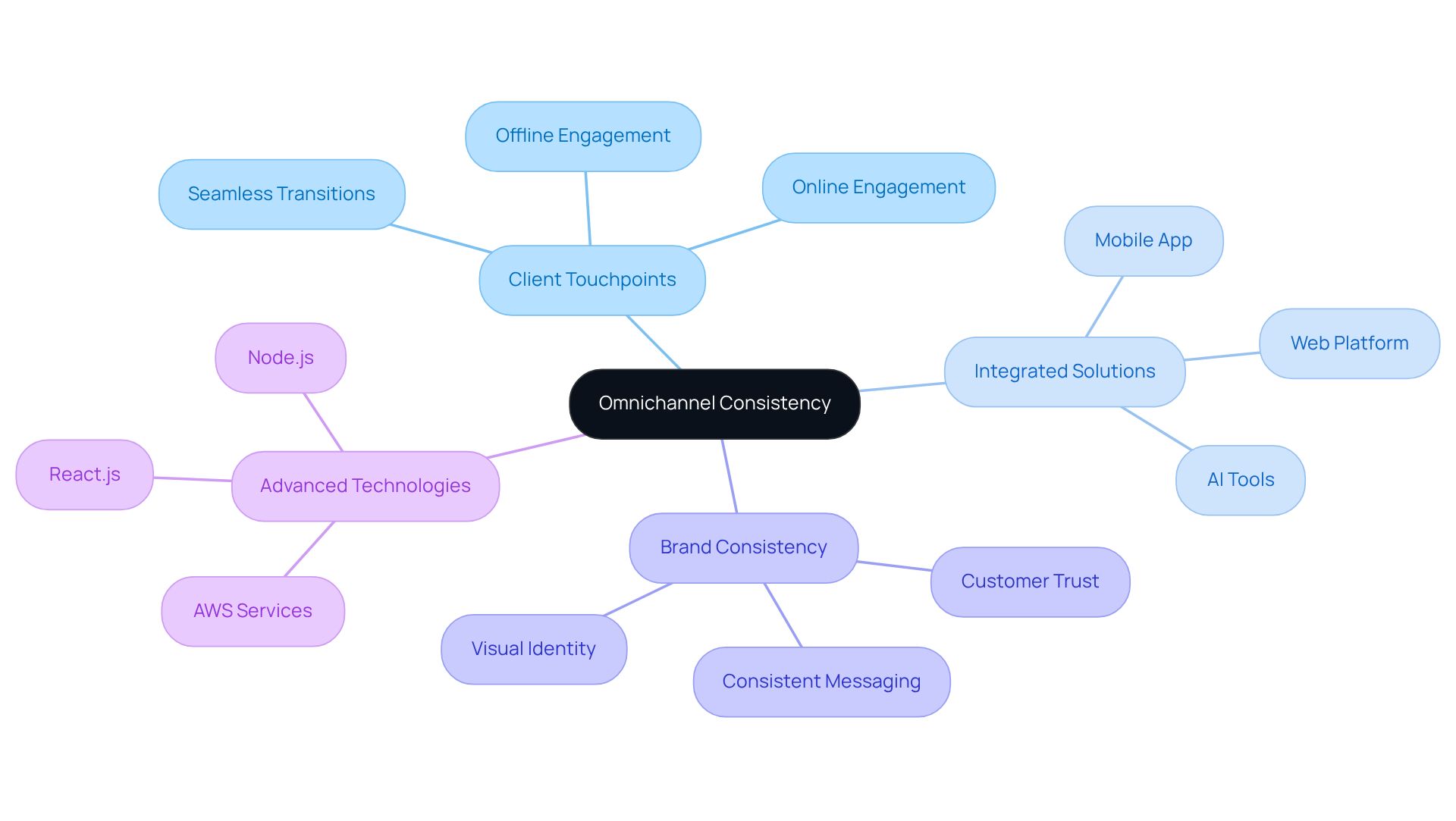
Employee Empowerment: Enabling Teams to Deliver Great CX
Empowering staff is essential for a successful cx strategy in client engagement. When team members feel valued and equipped with the right tools and knowledge, they are more likely to deliver exceptional service. Studio Graphene cultivates a culture of empowerment by providing ongoing training and resources, enabling employees to make informed choices that significantly enhance interactions with clients. This approach not only improves client satisfaction but also elevates employee morale and retention rates.
Companies that invest in employee education can expect a remarkable 129% return on investment, as highlighted by various studies, showcasing the financial advantages of such initiatives. Furthermore, organizations that offer personalized learning experiences report a 20% increase in employee engagement, which directly correlates with improved service quality.
As Mahatma Gandhi wisely stated, 'The best way to find yourself is to lose yourself in the service of others.' By prioritizing employee growth as part of their cx strategy, organizations can cultivate a motivated workforce dedicated to providing exceptional service to clients.
To implement comparable training programs, CTOs should consider developing customized learning pathways that align with both employee career aspirations and service objectives.
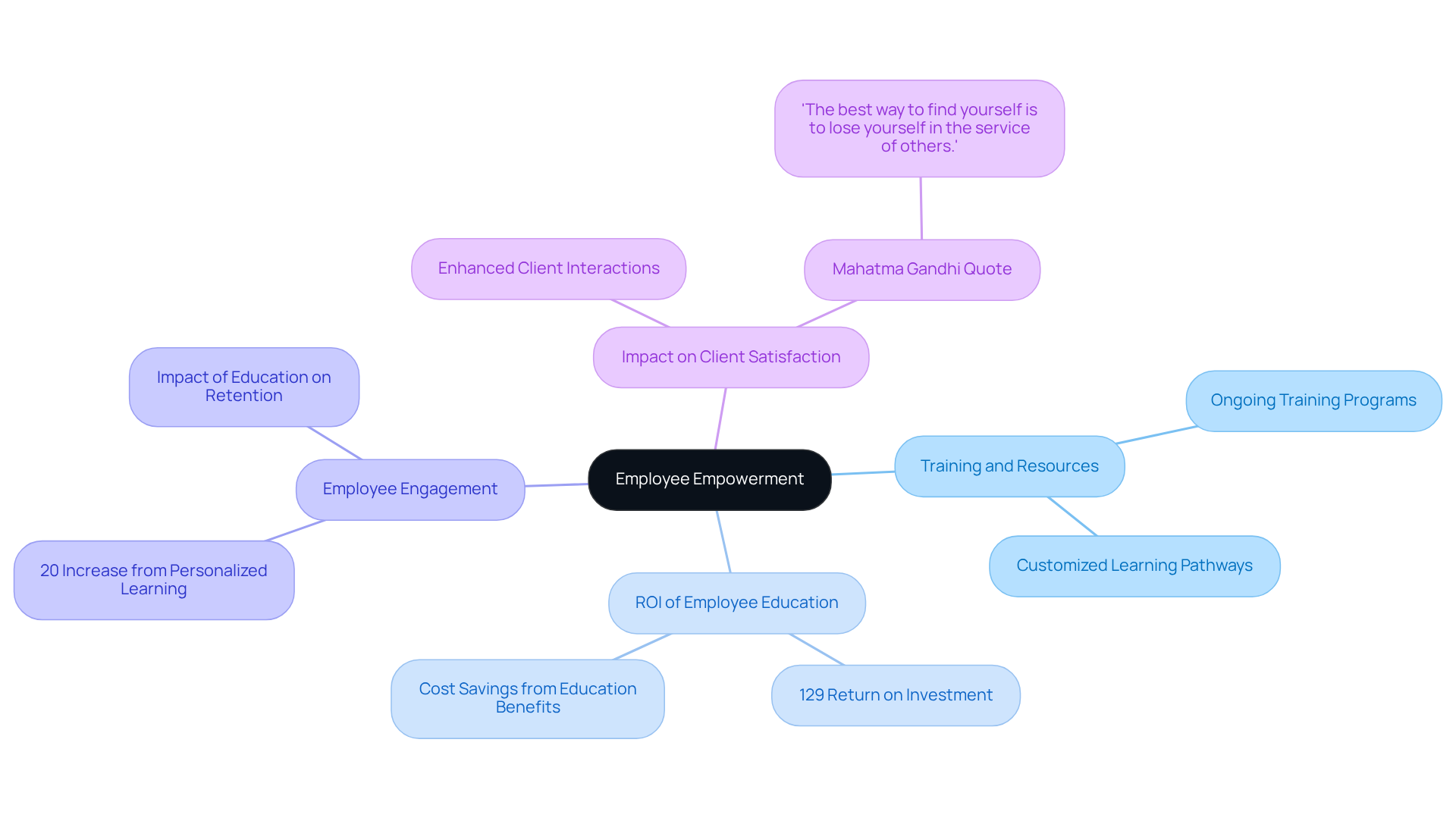
Measurement and Optimization: Adapting CX Strategies for Success
To ensure the success of a cx strategy, businesses must continuously measure and optimize their efforts. This entails monitoring key performance indicators (KPIs) such as:
- Satisfaction scores
- Net Promoter Scores (NPS)
- Retention rates
Studio Graphene utilizes data analytics to evaluate the effectiveness of their cx strategy, allowing for real-time adjustments based on client feedback and behavior. This iterative process ensures that the client experience remains pertinent and influential. For instance, the recent transformation project highlighted in the case studies resulted in a 12 percent increase in client satisfaction and a 3.7 percent rise in policy renewal rates, demonstrating the tangible benefits of a data-driven approach.
Effective optimization approaches frequently require a comprehensive understanding of client needs and behaviors. By employing methodologies such as the Investigative Analysis of CX Trends, organizations can pinpoint essential areas for enhancement. The implementation of in-page contextual FAQs during the client acquisition process has proven effective in addressing common queries, thereby reducing friction and enhancing user satisfaction.
Ultimately, the ability to track and analyze KPIs is essential for refining the cx strategy. By concentrating on significant metrics and promoting a culture of ongoing enhancement, organizations can guarantee that their client experience initiatives not only meet but surpass expectations. This commitment leads to sustained growth and client loyalty.

Smart Automation: Enhancing CX Through Technology
Intelligent automation is revolutionizing client interactions by streamlining routine tasks, allowing businesses to allocate more resources to address complex client needs. Implementing automation enables companies to drastically cut down the time spent on repetitive administrative duties, which often hampers the overall sales cycle. For instance, automated quoting software can diminish quote generation time from days to mere hours or even minutes, thereby enhancing responsiveness and client satisfaction.
Studio Graphene effectively integrates automation into its solutions, fostering improved operational efficiency and prompt client assistance. This approach not only accelerates service delivery but also enriches the client experience by ensuring that interactions are both relevant and personalized. Automation tools facilitate immediate personalization of quotes, enabling sales representatives to swiftly adapt to client needs—particularly crucial for intricate products with varied pricing models.
Furthermore, automating approval processes streamlines workflows, mitigating delays and enhancing communication with clients. By minimizing manual involvement, Studio Graphene ensures a consistent and accurate quoting procedure, vital for maintaining client trust and satisfaction. To further bolster timely client engagement, companies should consider implementing automated follow-ups and reminders, guaranteeing that clients remain informed throughout the process. Ultimately, the strategic deployment of automation as part of a cx strategy not only boosts efficiency but also fosters stronger client relationships, propelling growth.

Feedback Loops: Closing the Gap Between Customers and Businesses
Establishing efficient feedback mechanisms is crucial for a successful cx strategy that bridges the gap between clients and businesses. By actively seeking client feedback through surveys, reviews, and direct communication, companies can gain invaluable insights into client sentiments and experiences that inform their cx strategy. This proactive cx strategy not only enhances understanding but also lays the groundwork for improved services.
Studio Graphene places a strong emphasis on feedback as a fundamental aspect of their development process. By ensuring that user voices are heard and integrated into product iterations, they demonstrate a commitment to their cx strategy. This dedication not only elevates client satisfaction but also supports a robust cx strategy that fosters a deeper sense of loyalty and trust among users. In addition, companies that incorporate client feedback into their cx strategy are better positioned to adapt to changing needs and preferences, reinforcing their competitive edge in the market.
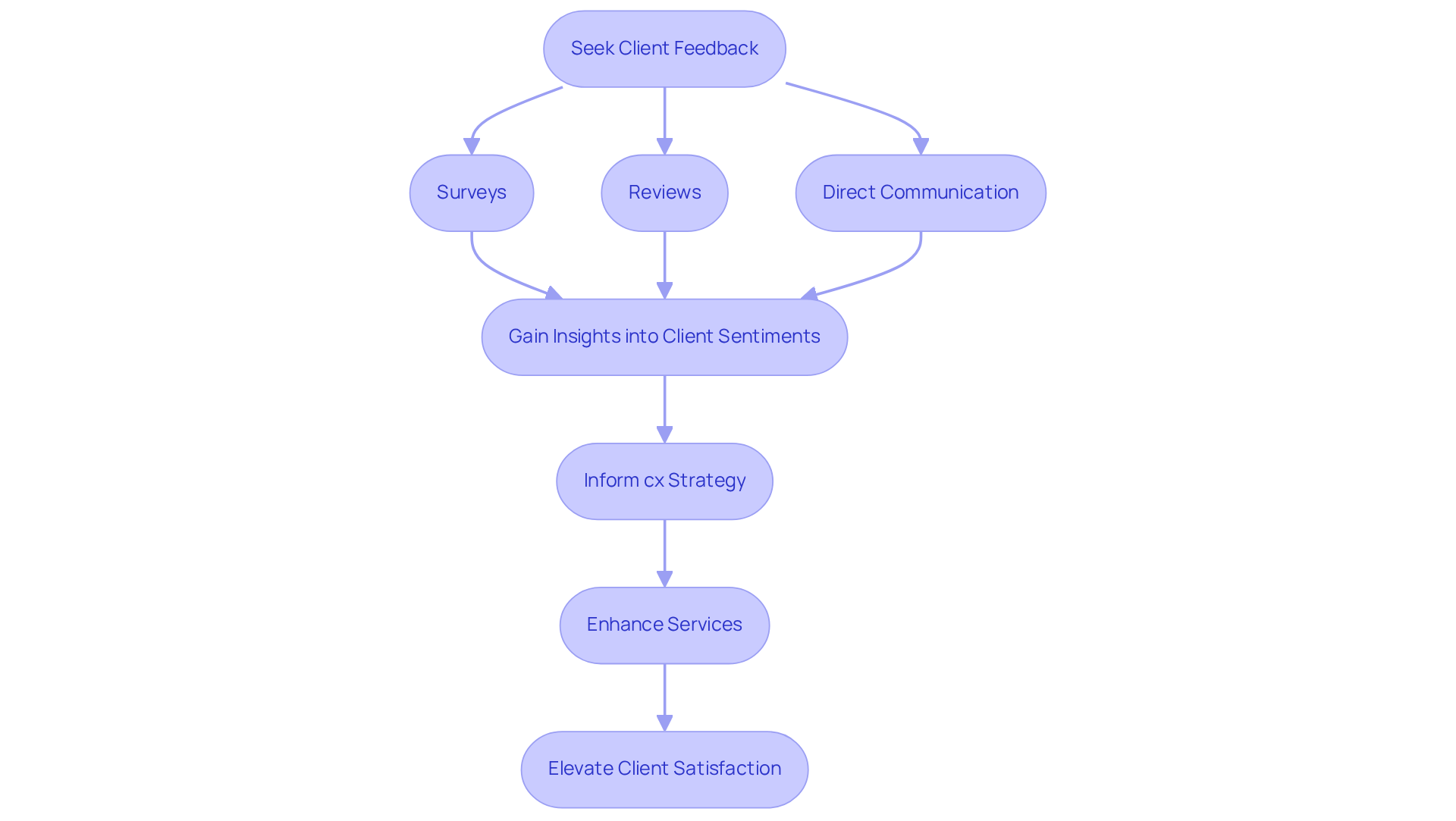
Cultural Alignment: Fostering a Customer-Centric Organization
Establishing a client-focused culture is essential for delivering exceptional client experiences as part of a strong cx strategy. This requires aligning the cx strategy with the company values, practices, and objectives to fulfill the needs and expectations of clients. Organizations that prioritize cultural alignment can significantly enhance client satisfaction and loyalty by implementing a strong cx strategy.
Studio Graphene exemplifies this approach by embedding a customer-first mindset throughout its teams. By making client needs central to decision-making, businesses can cultivate a more responsive and empathetic cx strategy. This alignment not only fosters trust but also propels client loyalty, as 95% of consumers believe that the cx strategy directly affects their loyalty to a brand. Furthermore, companies that excel in personalization as part of their cx strategy can enhance client loyalty 1.5 times more effectively than those that do not prioritize it.
To successfully foster a customer-first culture, organizations should implement cx strategies that encourage collaboration and communication across departments. This encompasses:
- Training staff to comprehend client perspectives
- Incorporating client feedback into product development processes
By doing so, companies can implement a cohesive cx strategy that resonates with customers, ultimately leading to increased satisfaction and retention.

Conclusion
Crafting a winning customer experience (CX) strategy is fundamentally rooted in understanding and implementing essential elements that foster meaningful connections between businesses and their clients. Embracing an agile methodology enables organizations to stay flexible and responsive to client feedback, ensuring that the evolving needs of users are met throughout the product development lifecycle. This adaptability is crucial for cultivating a customer-centric culture that not only values insights but also prioritizes seamless interactions across multiple channels.
The article underscores key components of an effective CX strategy, highlighting the significance of:
- Customer insights
- Journey mapping
- Personalization
- Omnichannel consistency
By leveraging data analytics and AI, businesses can gain a deeper understanding of client preferences and behaviors, allowing them to tailor experiences that resonate. Furthermore, empowering employees and establishing robust feedback loops are vital for fostering a responsive environment that enhances client satisfaction and loyalty.
Ultimately, organizations must recognize that a successful CX strategy is not a one-time effort but an ongoing commitment to excellence. By continually measuring and optimizing their approaches, businesses can adapt to changing market dynamics and client expectations. The pathway to exceptional customer experiences lies in embracing these best practices, fostering a culture of collaboration, and prioritizing the needs of clients at every touchpoint. As companies strive to enhance their CX strategies, the impact on customer loyalty and business growth will be profound, making it an imperative focus for sustained success.









